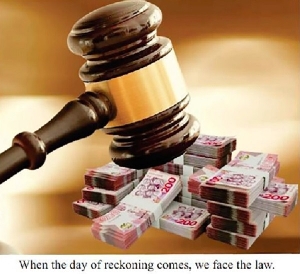The chairman of the Public Accounts Committee of Parliament looked directly at the chief director of a government ministry and said, “According to your annual report, you spent GH¢10.5 million on the renovation of your office building last year.... Are you listening, chief director? I noticed you’re distracted and this is an important inquiry.”
“Yes, Mr. Chairman, I’m listening.” The Chief Director stopped what he was doing and paid rapt attention.
‘Can you explain?’:
The chairman continued, “The auditors said they found official receipts and vouchers totalling GH¢7.2 million. Can you explain what accounted for the significant difference between what you said you spent and what the auditors discovered?”
The Chief Director with guilt and trepidation written all over his face, turned to the director of finance who sat close to him and whispered something to him.
Then, while the chairman of the Public Accounts Committee waited for an answer to his question, the chief director and his finance staff at the inquiry scrutinised the stack of documents in front of them.
Public is watching:
As the officers were busily searching for what accounted for the difference in figures, one of the Public Accounts Committee members said, “Mr. Chairman, while the chief director and his officials are looking for the answer to your rather simple question, I would like to remind them that the nation is watching them.”
The member’s statement troubled the chief director who looked at the member with an unhappy and stern face.
Not yet done with his remarks, the member continued, “In particular, if the chief director has forgotten, I want to remind him that this committee sitting is held in the full glare of the public who are watching. And that includes his family, members of his church, and his neighbours.”
The chief director’s raw nerves were torched badly. The first thing that came to his mind was to retort, “Mr. Chairman, I take a serious exception to what the member just said, and I would like him to withdraw his statement.”
But, remembering that the committee interrogating him was a parliamentary committee with the powers of a high court and that he could easily be charged with contempt, he decided to exercise restraint.
Yet, what his voice wouldn’t say for fear of contempt, his eyes spoke volumes as he stared angrily at the member and the rest of the committee.
Discomfort:
As I sat in the comfort of my living room watching the proceedings on TV, I felt the discomfort that occupied the mood of the inquiry. I wouldn’t want to be sitting where the chief director was sitting and answering the questions he was being asked.
Clearly, the chief director and his accounts officials did not have a ready answer to the question of accountability unleashed on them. The fowls, as they say, had come home to roost, because the people were now experiencing the unpleasant effects of their actions.
Or, more clearly, the day of reckoning was here, and the culprits would face the full rigours of the law.
“Chief director,” the chairman said, “it appears the documents you are perusing do not have the answer to my question. But, tell this committee, how much did you really spend on the renovation of your office premises last year? Did you spend what your written report says you spent, or did you spend what the auditors found out?”
To nail him further, and to create humour, the chairman said, “Will the documents produce the amount that seems to be missing?” The people laughed, but the chief director’s embarrassment deepened.
Even though I was not the chief director nor was I being questioned by the public accounts committee, I trembled at the prospect of being so publicly interrogated over the misappropriation of public funds.
Accountability:
At such a time as this, we can’t help but honestly evaluate our life for evils we’ve secretly committed—money we have spent that didn’t belong to us; lies we have told that clearly indict us; blatant deceptions that question our integrity; and shady deals that, if exposed, would shame us!
Why is it so easy to forget that the day of reckoning awaits us and that a day is coming when we shall be called upon to account for our deeds?
Since we sow what we reap, why not sow what we would want to reap later? As someone has noted, if you want the press to write favourably about you, then do what is favourable!
Opinions of Monday, 19 February 2024
Columnist: Lawrence Darmani



















